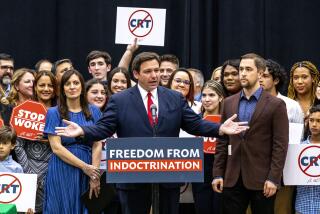Why scholars are challenging Howard Zinn and Diana West
- Share via
Left-wing historian Howard Zinn -- author of the perennially popular “A People’s History of the United States” -- has long been criticized by other historians on the left, a number of whom have publicly challenged both his facts and his interpretations.
Some of that criticism was aired again in an op-ed piece last week (after it was learned that former Indiana Gov. Mitch Daniels had sought to ban the book in that state’s schools). The Times also discussed the controversy over Zinn’s work at the time of his death in 2010.
Among the well-known liberal-to-left historians who have questioned Zinn’s scholarship are Princeton history professor Sean Wilentz and Georgetown history professor Michael Kazin.
This week, there’s been a similar burst of self-criticism, this time on the right. Ronald Radosh, a well-known conservative scholar and an author of many books, including “The Rosenberg File: A Search for Truth” about the Julius and Ethel Rosenberg case, has taken on a book by conservative columnist Diana West titled “American Betrayal” that he says is not to be believed -- although it has been endorsed or promoted by the Heritage Foundation and Breitbart.com, among others.
“Writing sixty years later,” Radosh says, “she claims that the evidence that has come to light in the interim not only vindicates [Sen. Joseph] McCarthy’s claims but goes well beyond anything he imagined. Throughout ‘American Betrayal,’ West uses the terms ‘occupied’ and ‘controlled’ to describe the influence the Soviet Union exerted over U.S. policy through its agents and spies. She believes she has exposed ‘the Communist-agent-occupation of the U.S. government’ during the Roosevelt and Truman eras.”
According to Radosh, West writes without understanding historical context of the subject she’s writing about and, apparently, without familiarity with much of the scholarly literature. And she ignores findings when they contradict her “yellow journalism conspiracy theories,” he says.
I’m not in a position to judge the accuracy of “American Betrayal.” From Radosh’s description, West’s conclusions certainly sound way over the top and out of line with the historical debate as I’ve always heard it.
But I do feel heartened when I read scholars who are located on a particular end of the political spectrum -- left or right -- taking on others on their own side. It’s an indication that everyone is not marching uniformly in lock step, unquestioningly endorsing the findings of those who fall within their camp and attacking those outside it. Obviously, historians are entitled to their political views and their interpretations, but they’re also required to be skeptical and intellectually honest.
[Update, 2:40 p.m., August 8: An earlier version of this post included Columbia professor Eric Foner among those who had questioned Howard Zinn’s scholarship.]
ALSO:
Photo gallery: Ted Rall cartoons
The Bible’s case for immigration reform
More to Read
A cure for the common opinion
Get thought-provoking perspectives with our weekly newsletter.
You may occasionally receive promotional content from the Los Angeles Times.











